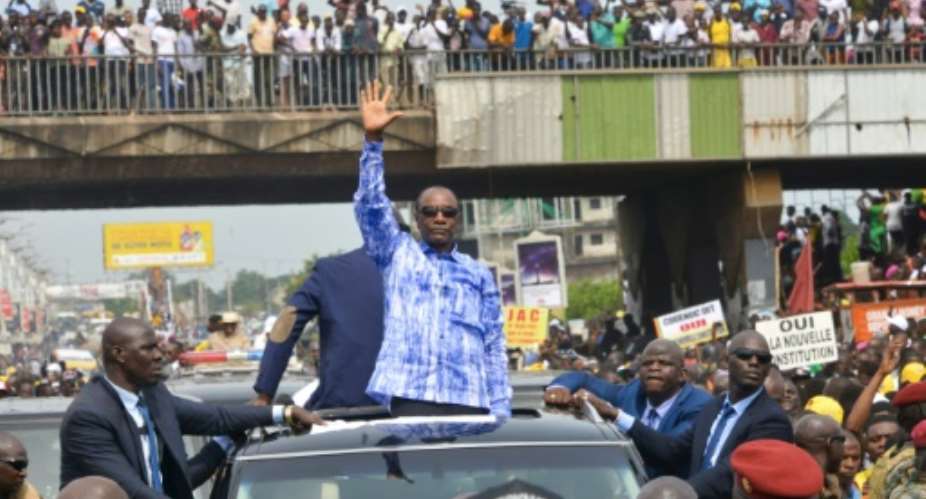Thousands of Guinean protesters took to the streets in the capital Conakry Thursday, in fresh demonstrations days after deadly clashes erupted during a funeral march for those killed in recent anti-government rallies.
The poor West African country has been shaken by violence during weeks of protest over opposition suspicions that President Alpha Conde is seeking to prolong his rule.
Demonstrators clad in the red of the opposition stretched across several kilometres of a highway leading to the capital's 28 September stadium, an AFP reporter said, adding it was difficult to quantify the exact number of protesters.
"Walk peacefully and quietly," and "Don't respond to provocations", the National Front for Defence of the Constitution (FNDC), an alliance of opposition parties and unions, warned on social media in a bid to avoid confrontation with security forces.
Demonstrators demanded the release of government critics imprisoned since the beginning of the anti-government unrest.
Dozens of police vehicles followed the crowd, who shouted "justice for the dead".
Tensions in the capital are high just days after the deaths of three youths, who the opposition says were shot by the security services as they attended a funeral march for 11 people killed in unrest since October 24.
At least 16 civilians and a police officer have been killed in bloody clashes with security forces since protests began in mid-October, according to the opposition, with dozens injured and dozens more arrested.
FNDC plans further rallies in other parts of the country.
Unlike the first demonstrations, these have obtained the green light from authorities.
Conde has blamed the protesters for the gunfire and accused the opposition of trying to overthrow the government.
A former opposition figure who was jailed and spent time in exile under Guinea's previous authoritarian regimes, Conde became the country's first democratically elected president in 2010.
The 81-year-old, whose second term ends next year, launched constitutional consultations in September, saying the former French colony's basic law "concentrates corporate interests" and needed reform.
But his adversaries say the president will try to push through an amendment allowing him to seek a third term in the nation of 13 million. He has neither confirmed nor denied his intention to seek a third term in elections due in 2020.





 NDC demands complete overhaul of security protocols at EC to safeguard electoral...
NDC demands complete overhaul of security protocols at EC to safeguard electoral...
 Ghana reaches interim deal with international bondholders — Finance Ministry
Ghana reaches interim deal with international bondholders — Finance Ministry
 Mahama to form joint army-police anti-robbery squads to safeguard 24-hour econom...
Mahama to form joint army-police anti-robbery squads to safeguard 24-hour econom...
 Another man jailed eight months over shrinking penis
Another man jailed eight months over shrinking penis
 Ghana to adjust external bond deal to meet IMF debt sustainability goals — Finan...
Ghana to adjust external bond deal to meet IMF debt sustainability goals — Finan...
 IMF negotiations: We've not failed to reach an agreement with bondholders; we’ve...
IMF negotiations: We've not failed to reach an agreement with bondholders; we’ve...
 EC begins recruitment of temporary electoral officials, closes on April 29
EC begins recruitment of temporary electoral officials, closes on April 29
 NPP lost the 2024 elections in 2022 due to inflation and cedi depreciation — Mar...
NPP lost the 2024 elections in 2022 due to inflation and cedi depreciation — Mar...
 Your good heart towards Ghana has changed; don’t behave like Saul - Owusu Bempah...
Your good heart towards Ghana has changed; don’t behave like Saul - Owusu Bempah...
 Wa West: NDC organizes symposium for Vieri Ward Women
Wa West: NDC organizes symposium for Vieri Ward Women
